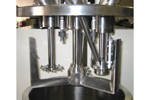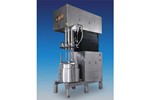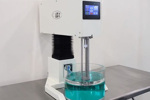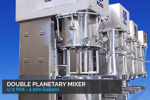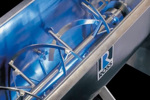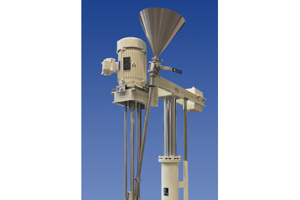Mixing and Blending
MIXING AND BLENDING CASE STUDIES, WHITE PAPERS, & APPLICATION NOTES
-
Recommended Mixing Equipment For Catalytic Slurries
Catalytic slurries consisting of solid catalysts and support materials suspended in a liquid medium are commonly prepared in batch tanks agitated by low-speed mixers such as propellers, anchor paddles and pitched blade impellers. These devices can sometimes suffer from long cycle times and inadequate dispersion especially in large batches. Technologies like the Ross Solids/Liquid Injection Manifold (SLIM) offer a more practical method of wetting out powders and quickly achieving the desired particle size distribution in high percent solids slurries.
-
Recommended Mixing Equipment For Polyvinyl Alcohol Solutions
Polyvinyl alcohol (PVOH, also referred to as PVA) is a versatile polymer that plays multiple roles in the manufacture of adhesives, sealants, cosmetics, paper, textiles and many other products. This paper describes the benefits of preparing PVOH solutions in a well-designed Multi-Shaft Mixer capable of bulk agitation, high shear deagglomeration, and superior heat transfer.
-
Pesticide Gel Production In A Ross VersaMix Triple-Shaft Mixer
Herbicides and insecticides in gel form enable easy, accurate and controlled application for increased efficacy and safety. Compared to traditional pesticides that are sprayed or sprinkled, gel formulations are smeared onto targeted surfaces which reduces the risk of chemical runoff and contamination.
-
Mixers that Gel With Your Application
A global cosmetic company with the goal of expanding their gel manufacturing capabilities found a solutions with the 100-gallon VersaMix Multi-Shaft Mixer.
-
Sanitary Mixing In Multi-Agitator Systems
Multi-shaft mixers are versatile systems used in the production of pharma and medical products. Here, we discuss equipment features commonly supplied on multi-shaft mixers for sanitary applications.
MIXING AND BLENDING PODCASTS, VIDEOS, AND MORE
-
Laboratory High Shear Mixers
This laboratory high shear mixer consists of a single stage four-blade rotor that turns at high speed within a stationary stator. Learn how the design promote continuous flow, fast mixing, and more.
-
Double Planetary Mixer Overview
This double planetary mixer includes two blades that rotate on their own axes while simultaneously orbiting the mix vessel on a common axis. Watch to learn more about this mixing technology.
-
Ribbon Blenders For Quality And Long-Term Performance
Known worldwide for heavy-duty robust construction, high quality materials, and fine craftsmanship, these ribbon blenders meet the toughest standards for quality and long-term performance.

